You know, growing up in a bustling household where dinner was the highlight of the day, I quickly learned that the right sauce could turn a simple seafood dish into a family favorite. Picture this: a warm evening, the aroma of freshly cooked fish filling the air, and that zesty lemon butter sauce ready to be drizzled on top. It’s these little touches that make cooking not just a task, but a joy.
Table of Contents
Seafood lovers, rejoice! Whether you’re diving into oceanic delights for the first time or you’re a seasoned pro looking to up your game, this guide is for you. I’m serving up some of the best tips, tricks, and recipes to make your seafood adventures downright legendary.
Understanding the Importance of Sauce in Seafood Dishes
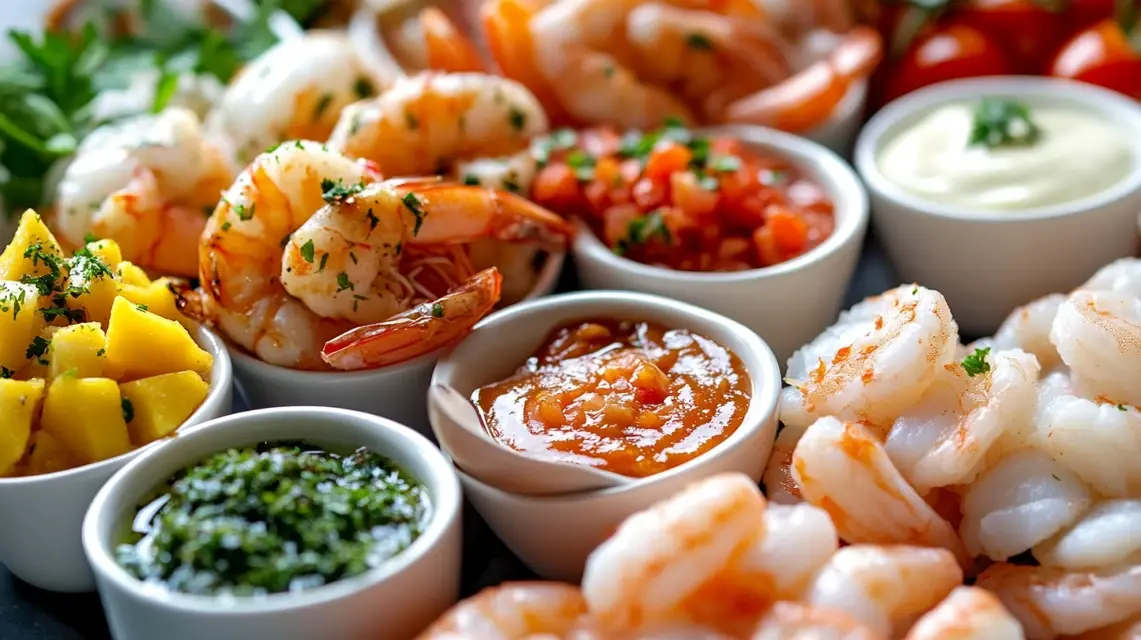
When it comes to seafood, the right sauce can make or break your dish. What sauce is best for seafood? is a common question among home cooks and chefs alike. Honestly, finding that perfect match can transform a simple meal into a gourmet experience. Let’s dive into why sauces are essential and explore some top choices that complement various seafood types.
Why the Right Sauce Matters for Seafood
Let’s face it, seafood is like that versatile friend who gets along with everyone. But, pair it with the perfect sauce, and you’ve got a match made in culinary heaven. The right sauce doesn’t just complement the seafood; it enhances its natural flavors, adds moisture, and brings a burst of excitement to your taste buds.
Top 5 Sauces to Elevate Your Seafood
Here are five sauces that have become staples in my kitchen, each bringing its own unique flair to seafood dishes:
1. Lemon Butter Sauce
Bright, tangy, and rich—this sauce is a classic that never disappoints.
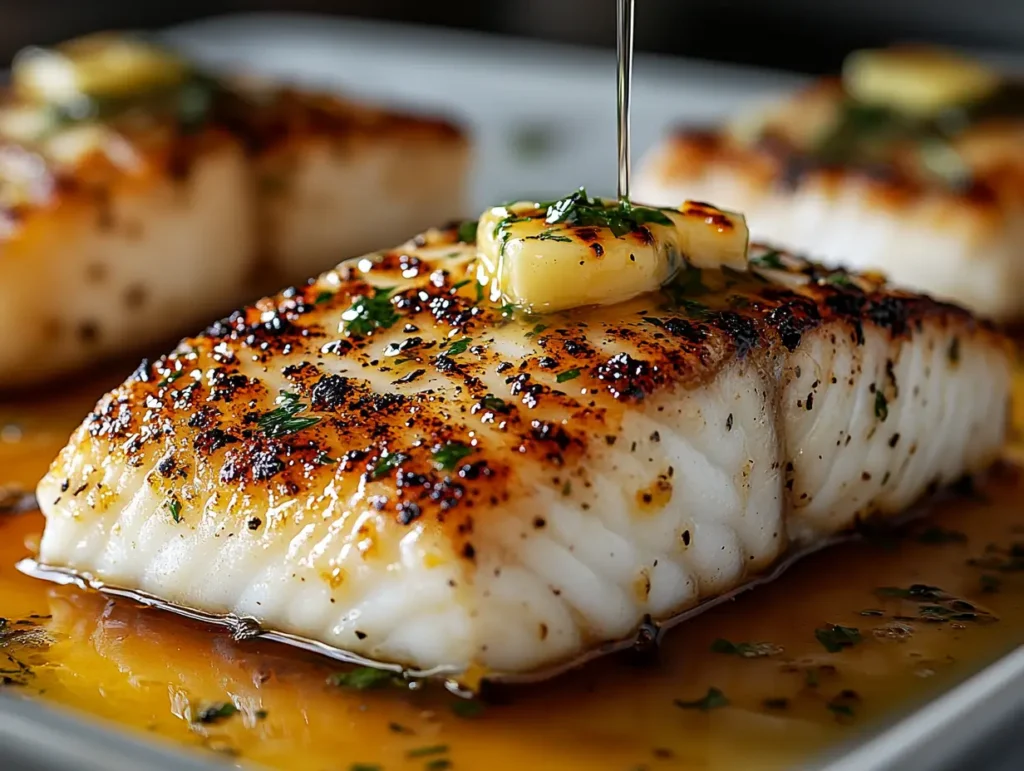
Ingredients You’ll Need:
- 1/2 cup unsalted butter
- 2 cloves garlic, minced
- 1/4 cup fresh lemon juice
- Zest of one lemon
- Salt and freshly ground black pepper, to taste
- 2 tablespoons fresh parsley, chopped
Step-by-Step Instructions:
- In a saucepan over medium heat, melt the butter.
- Add the minced garlic and sauté until fragrant, about 1 minute.
- Stir in the lemon juice and zest. Let it simmer for 2-3 minutes.
- Season with salt and pepper to taste.
- Remove from heat and stir in the chopped parsley.
This sauce pairs wonderfully with grilled fish, shrimp, or drizzled over scallops.
Print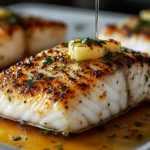
Lemon Butter Sauce
- Total Time: TT10M
- Yield: About ¾ cup 1x
- Diet: Low Lactose
Description
This Lemon Butter Sauce is bright, buttery, and loaded with fresh citrus and herbs. It’s a simple yet flavorful finishing touch for fish, shrimp, scallops, or veggies.
Ingredients
-
- ½ cup unsalted butter
2 cloves garlic, minced
¼ cup fresh lemon juice
Zest of 1 lemon
Salt and freshly ground black pepper, to taste
2 tablespoons fresh parsley, chopped
- ½ cup unsalted butter
Instructions
- Melt the butter
In a small saucepan over medium heat, melt the butter. - Sauté garlic
Add the minced garlic and cook until fragrant, about 1 minute. - Add lemon
Stir in the lemon juice and zest. Simmer for 2–3 minutes. - Season
Add salt and black pepper to taste. - Finish with parsley
Remove from heat and stir in chopped parsley just before serving.
Notes
Serve warm over grilled seafood, pan-seared scallops, or roasted vegetables.
Make it ahead by storing in the fridge; reheat gently to avoid separation.
Add capers for a briny twist that complements fish beautifully.
- Prep Time: PT5M
- Cook Time: CT5M
- Category: dinner
- Method: Simmering
- Cuisine: American
Nutrition
- Serving Size: 1 tablespoon (approx)
- Calories: 90 kcal
- Sugar: 1 g
- Sodium: Varies
- Fat: 10 g
- Saturated Fat: 6 g
- Unsaturated Fat: 3 g
- Trans Fat: _____
- Carbohydrates: 1g
- Fiber: ___
- Protein: 1g
- Cholesterol: 25 mg
2. Garlic Aioli
Creamy with a punch of garlic, this Mediterranean favorite is a must-try.
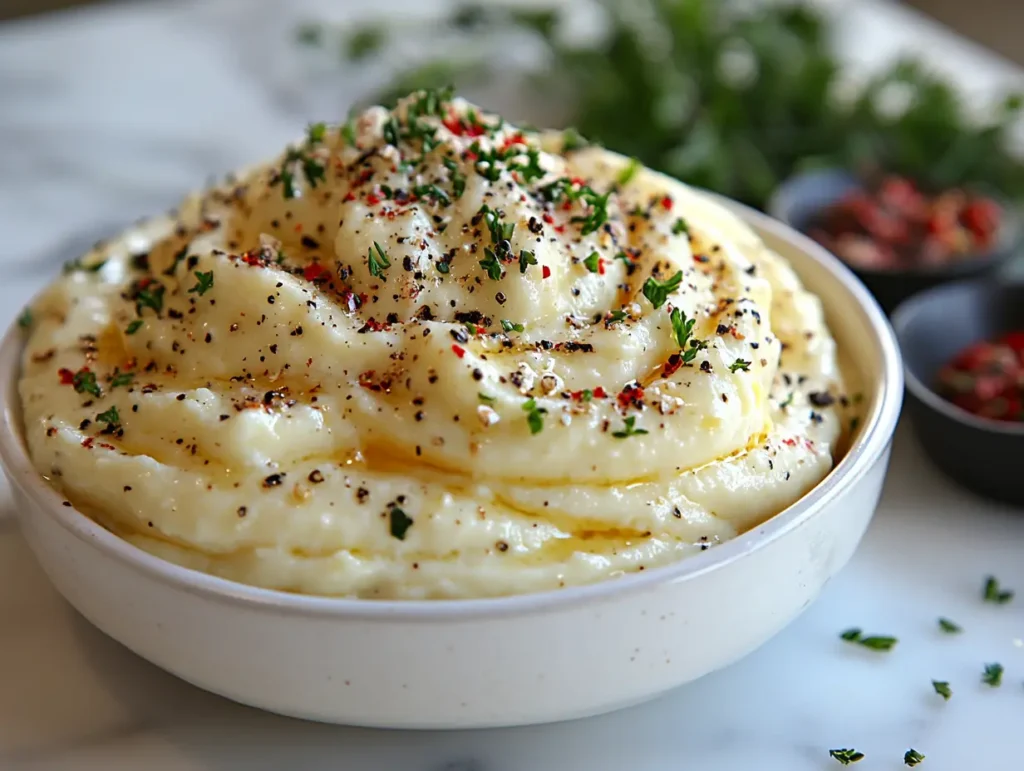
Ingredients You’ll Need:
- 1 cup mayonnaise
- 3 cloves garlic, minced
- 2 teaspoons fresh lemon juice
- Salt and freshly ground black pepper, to taste
Step-by-Step Instructions:
- In a bowl, combine the mayonnaise, minced garlic, and lemon juice.
- Mix well until smooth.
- Season with salt and pepper to taste.
Serve this aioli as a dipping sauce for fried calamari, crab cakes, or spread on a seafood sandwich.
Print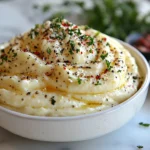
Garlic Aioli
- Total Time: TT5M
- Yield: 1 cup 1x
- Diet: Low Calorie
Description
This creamy Garlic Aioli is rich, garlicky, and tangy — the perfect dip or spread to elevate burgers, sandwiches, roasted veggies, or fries.
Ingredients
1 cup mayonnaise
3 cloves garlic, minced
2 teaspoons fresh lemon juice
Salt and freshly ground black pepper, to taste
Instructions
- Combine ingredients
In a small bowl, add mayonnaise, minced garlic, and lemon juice. - Mix until smooth
Stir well until the aioli is creamy and fully combined. - Season to taste
Add salt and black pepper to your liking. Mix again and chill if desired.
Notes
Use a microplane for finely grated garlic if you want a smoother texture.
Let it rest for 15–30 minutes in the fridge — the flavors intensify beautifully.
Swap the base: Try using Greek yogurt for a lighter variation.
- Prep Time: PT5M
- Cook Time: ___
- Category: Dinner
- Method: Mixing
- Cuisine: Mediterranean
Nutrition
- Serving Size: 1 tablespoon (approx)
- Calories: 95 kcal
- Sugar: 1 g
- Sodium: Varies
- Fat: 10 g
- Saturated Fat: 1.5 g
- Unsaturated Fat: 7g
- Trans Fat: ____
- Carbohydrates: 1g
- Fiber: 0 g
- Protein: 1g
- Cholesterol: 5mg
3. Tartar Sauce
This classic sauce brings a tangy and slightly sweet flavor, perfect for fried seafood.
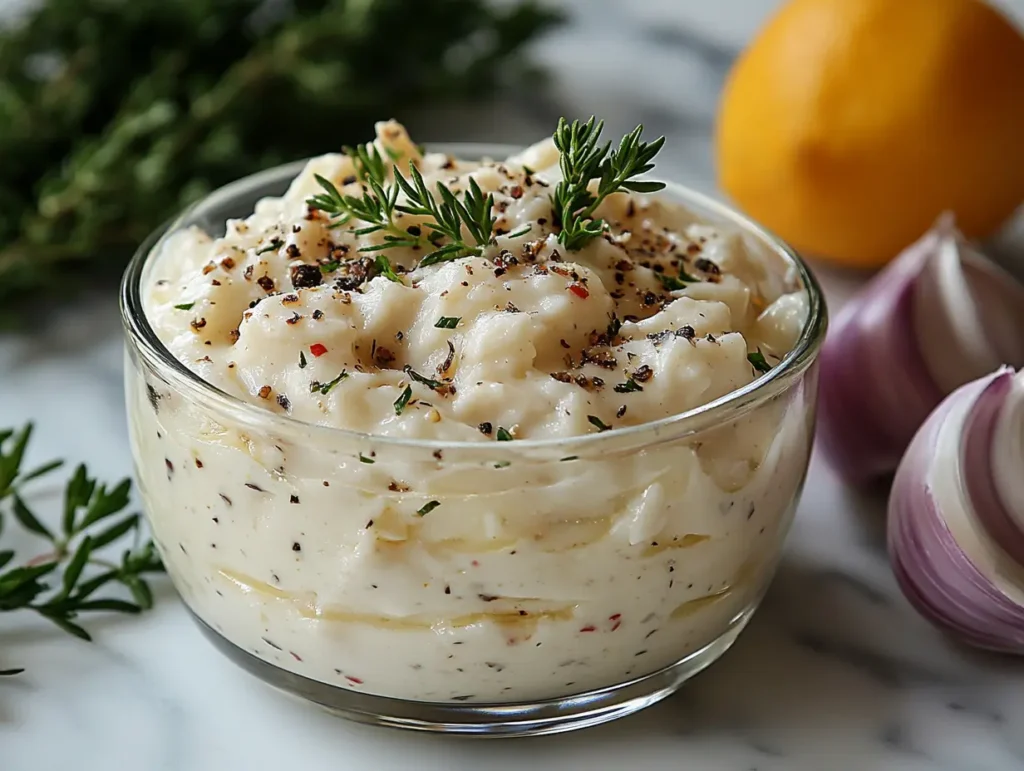
Ingredients You’ll Need:
- 1 cup mayonnaise
- 2 tablespoons dill pickles, finely chopped
- 1 tablespoon capers, chopped
- 1 teaspoon Dijon mustard
- 1 tablespoon fresh lemon juice
- Salt and freshly ground black pepper, to taste
Step-by-Step Instructions:
- In a bowl, combine all the ingredients.
- Mix until well incorporated.
- Adjust seasoning with salt and pepper as needed.
Ideal for pairing with fish sticks, fried shrimp, or even as a spread on fish sandwiches.
Print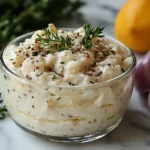
Tartar Sauce
- Total Time: TT5M
- Yield: 1 cup 1x
- Diet: Low Calorie
Description
This Tartar Sauce is tangy, creamy, and perfectly balanced with dill pickles, capers, and a touch of lemon. A must-have classic for seafood dishes like fish fillets, crab cakes, and shrimp.
Ingredients
1 cup mayonnaise
2 tablespoons dill pickles, finely chopped
1 tablespoon capers, chopped
1 teaspoon Dijon mustard
1 tablespoon fresh lemon juice
Salt and freshly ground black pepper, to taste
Instructions
- Combine ingredients
In a medium bowl, add mayonnaise, dill pickles, capers, mustard, and lemon juice. - Mix well
Stir until the mixture is smooth and fully combined. - Adjust seasoning
Add salt and pepper to taste. Chill before serving for best flavor.
Notes
Make ahead: Let the sauce chill for 30 minutes to develop deeper flavor.
Try sweet pickles if you prefer a milder, sweeter tartar sauce.
Use it as a dip for fries or a spread for fish sandwiches!
- Prep Time: PT5M
- Cook Time: __
- Category: Dinner
- Method: Mixing
- Cuisine: American
Nutrition
- Serving Size: 1 tablespoon (approx)
- Calories: 90 kcal
- Sugar: 1 g
- Sodium: Varies
- Fat: 10 g
- Saturated Fat: 1.5 g
- Unsaturated Fat: 7g
- Trans Fat: _____
- Carbohydrates: 1g
- Fiber: 0 g
- Protein: 1g
- Cholesterol: 5mg
4. Spicy Sriracha Mayo
For those who like a kick, this spicy and creamy sauce adds excitement to any seafood dish.
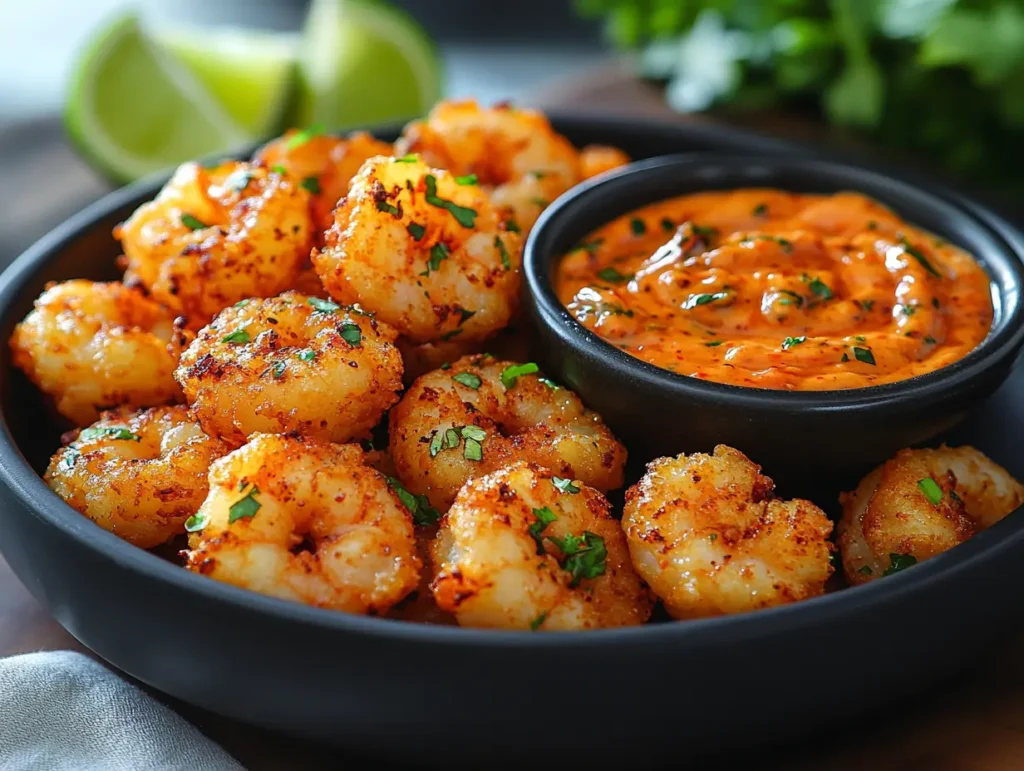
Ingredients You’ll Need:
- 1/2 cup mayonnaise
- 2 tablespoons Sriracha sauce
- 1 teaspoon lime juice
- Salt, to taste
Step-by-Step Instructions:
- In a bowl, whisk together the mayonnaise, Sriracha sauce, and lime juice.
- Taste and season with salt if necessary.
This sauce is fantastic with grilled shrimp, fish tacos, or as a dipping sauce for crab legs.
Print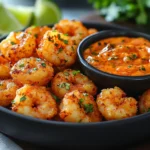
Spicy Sriracha Mayo
- Total Time: TT5M
- Yield: ½ cup 1x
- Diet: Low Lactose
Description
This Spicy Sriracha Mayo is creamy, bold, and has just the right kick! It’s a fast, flavorful spread or dip that pairs beautifully with burgers, sushi, fries, tacos, and more.
Ingredients
½ cup mayonnaise
2 tablespoons Sriracha sauce
1 teaspoon lime juice
Salt, to taste
Instructions
- Whisk it all together
In a bowl, combine mayonnaise, Sriracha sauce, and lime juice. Whisk until smooth. - Taste and adjust
Add salt to taste. Feel free to adjust the Sriracha or lime to dial the heat or tang to your liking.
Notes
Make it vegan by swapping in vegan mayo — it’s just as creamy and spicy.
Chill before serving for 10–15 minutes to let the flavors meld.
Use it on everything from sandwiches and tacos to sushi rolls and sweet potato fries.
- Prep Time: PT5M
- Cook Time: __
- Category: Dinner
- Method: Mixing
- Cuisine: Asian Fusion
Nutrition
- Serving Size: 1 tablespoon (approx)
- Calories: 90 kcal
- Sugar: 1 g
- Sodium: Varies
- Fat: 10 g
- Saturated Fat: 1.5g
- Unsaturated Fat: 7g
- Trans Fat: _____
- Carbohydrates: 1g
- Fiber: 0 g
- Protein: 1g
- Cholesterol: 5mg
5. Mango Salsa
Fresh, sweet, and tangy—this salsa brings a tropical twist to your seafood.
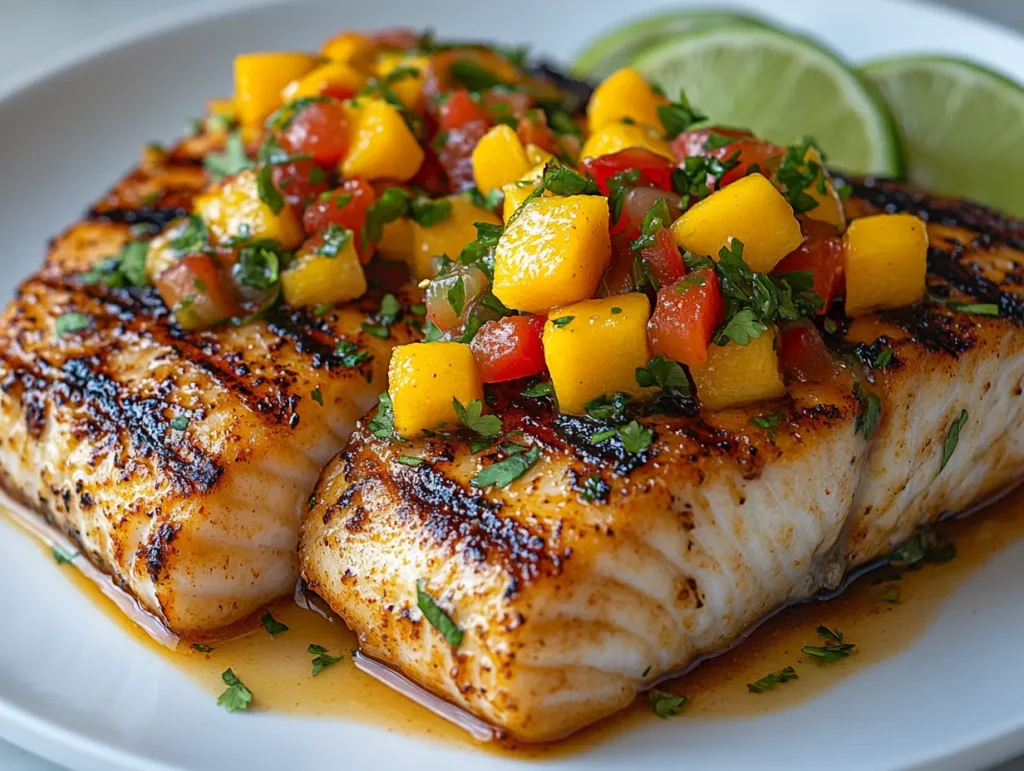
Ingredients You’ll Need:
- 1 ripe mango, diced
- 1/2 red onion, finely chopped
- 1/2 red bell pepper, diced
- 1 jalapeño, seeded and minced
- 2 tablespoons fresh cilantro, chopped
- Juice of one lime
- Salt and freshly ground black pepper, to taste
Step-by-Step Instructions:
- In a bowl, combine all the ingredients.
- Mix well and season with salt and pepper to taste.
Perfect atop grilled fish, shrimp skewers, or served alongside seared scallops.
Print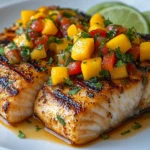
Mango Salsa
- Total Time: TT10M
- Yield: 2 cups 1x
- Diet: Vegan
Description
This Mango Salsa is fresh, sweet, and spicy — the perfect vibrant topping for grilled fish, shrimp, or scallops. It also makes a killer dip with chips!
Ingredients
1 ripe mango, diced
½ red onion, finely chopped
½ red bell pepper, diced
1 jalapeño, seeded and minced
2 tablespoons fresh cilantro, chopped
Juice of 1 lime
Salt and freshly ground black pepper, to taste
Instructions
- Combine ingredients
In a medium bowl, add mango, red onion, bell pepper, jalapeño, cilantro, and lime juice. - Mix and season
Stir well to combine. Add salt and pepper to taste.
Notes
Use ripe mangoes for best sweetness and texture.
Make it ahead and chill for 30 minutes to let flavors develop.
Optional additions: diced avocado, cucumber, or pineapple for a twist.
- Prep Time: PT10M
- Cook Time: __
- Category: dinner
- Method: Mixing
- Cuisine: Mexican-inspired
Nutrition
- Serving Size: ¼ cup
- Calories: 35 kcal
- Sugar: 7g
- Sodium: Varies
- Fat: 1g
- Saturated Fat: 0g
- Unsaturated Fat: 1g
- Trans Fat: ____
- Carbohydrates: 9g
- Fiber: 1g
- Protein: 1g
- Cholesterol: 0mg
Cooking Tips: Making the Most of Your Sauces
- Fresh Ingredients: Always use fresh herbs, garlic, and citrus for the best flavor.
- Balance Flavors: Taste as you go to ensure the right balance of acidity, sweetness, and spice.
- Consistency Matters: Adjust the thickness of your sauce by adding more liquid (like lemon juice or vinegar) or thickening agents (like mayonnaise or yogurt).Wikipedia
A Personal Touch
I remember the first time I made the lemon butter sauce for a family dinner. My youngest, ever the picky eater, took one bite of the fish and exclaimed, “Mom, this tastes like a restaurant!” Moments like that remind me why I love cooking—it’s not just about the food, but the joy it brings to those around us.
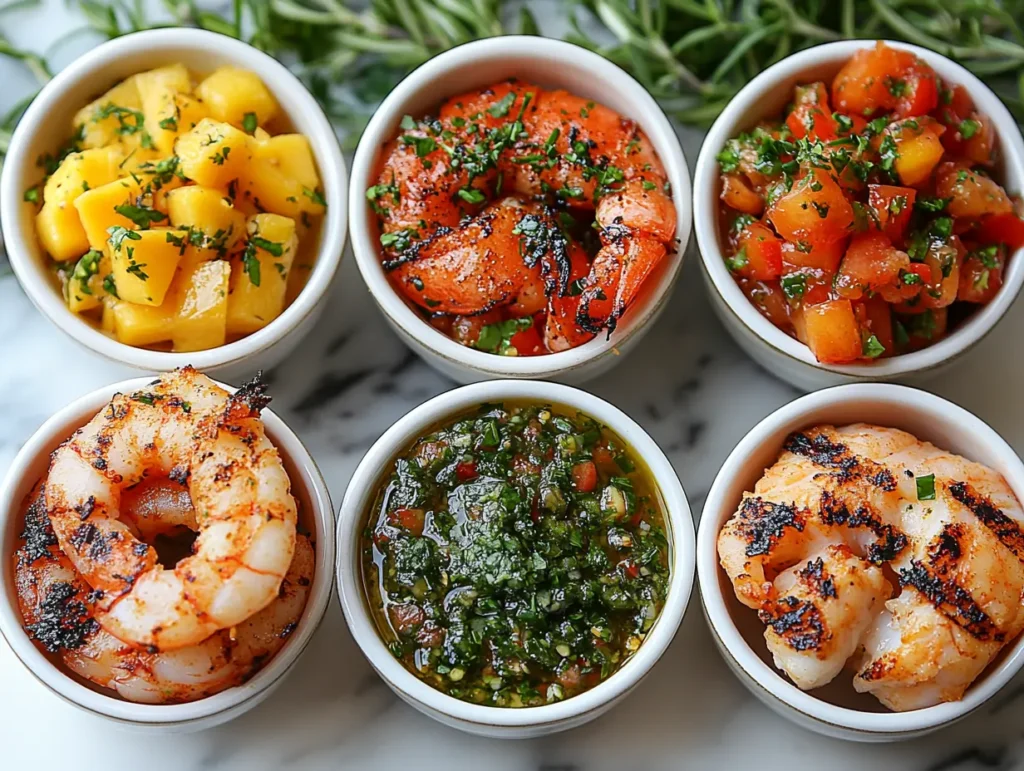
FAQs
What is a seafood boil made of?
A seafood boil typically includes a variety of shellfish such as shrimp, crab, clams, and mussels, often seasoned with spices, lemon, and garlic, and cooked together with vegetables like corn and potatoes.
What is seafood sauce made of?
Seafood sauce can vary, but it commonly includes ingredients like mayonnaise, lemon juice, garlic, herbs, and spices to complement the flavors of the seafood.
What are the ingredients in crab boil liquid?
Crab boil liquid usually consists of water, salt, Old Bay seasoning, lemon, garlic, onions, and sometimes beer or other spices to enhance the flavor of the crab.
What sauce is best for seafood?
The best sauce for seafood depends on the type of seafood and personal preference, but popular choices include lemon butter sauce, garlic aioli, tartar sauce, and creamy dill sauce.
